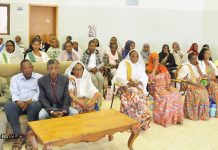By
Robbi Herfandi
Africa-Press – Eritrea. MSMEs (Micro, Small and Medium Enterprises) are one of the sustainability narratives that are an important sector in the global economy, both in developed and developing countries. They face significant challenges from Climate Change and Global Geopolitical Shifts that can impact their operations and economic stability. MSMEs are a sector that must be prioritised, because MSMEs have a very large role as the backbone to support the economy of developed and developing countries at large such as Indonesia, to create broader economic stability requires a combination of various strategies that adapt to the economic and environmental conditions faced by Indonesia. Indonesia’s main issues are access to finance for growth, MSME Quality, MSME Digital Ecosystem, and Green Product Innovation.
Since the introduction of the sustainability narrative (SDGs) to the whole world in 2015 by the United Nations, the MSME paradigm is the backbone for all countries. The existence of MSMEs cannot be avoided or denied in various parts of the world. Because its existence really supports people’s lives in terms of distributing people’s income. Apart from that, it is also able to create creative reasoning that is in line with efforts to develop elements of innovation that support life like the Indonesian people. MSMEs are able to absorb labor on a large scale, considering that Indonesia’s population is around 117 million or a percentage of 97% of the business world’s workforce (Kemenkeu) and the contribution of MSMEs reaches 61% of Indonesia’s GDP, equivalent to IDR 9,850 trillion (Kadin), so that this phenomenon can reduce the unemployment rate and make a big contribution to the economy. From this figure it can be seen that the existence of MSMEs has been inspired to support the Indonesian economy. However, the world is not free from challenges that continue to pursue it, there are still challenges that follow such as minimal innovation and technology, digital ecosystems for MSMEs and green product innovation for economic stability which is widely felt, because it is hampered by a lack of business capital and incentive assistance from the government and institutions. Other financial matters, so they are unable to take progressive steps in this regard, because the key to MSMEs is capital, these challenges lead to many other challenges such as climate change and major global geopolitical changes which can make economic stability unstable.
Recent climate change has made challenges increasingly complex, such as natural disasters, floods, droughts and storms, as well as increasingly dry and intense land that can damage infrastructure, disrupt operations and result in losses for MSMEs. The challenges of geopolitical change are also taken into account because they can disrupt global supply chains and reduce market access. So that trade policies can change and this will have an impact on the competitiveness of MSME products in the international market, and if we look at other aspects, such as domestic political stability, it also has an effect, such as value fluctuations cannot be predicted so that import costs can affect profits, and make investors experience doubts about investing their wealth. MSMEs facing significant challenges from climate change and global geopolitical dynamics need support from governments and international organizations as well as developed countries, so that MSMEs can increase their resilience to these changes. The success of MSMEs in overcoming these challenges is not only important for the sustainability of their businesses but also for broader economic stability. Therefore, there is a need for effective adaptation and mitigation strategies to reduce the above reality.
Indonesian MSMEs
Developing countries such as Indonesia have an endowment structure that is characterised by abundant unskilled work and latah, like 2 objects that are opposite to each other. as well as scarce capital resulting in following the current trend of MSME culture. So that the products produced lack quality, do not innovate. and that can result in dulling the expansion of an item and not being in demand by the global market. Seeing the abundance of Indonesian MSMEs, there is no question that in 2023 the number of Indonesian MSMEs will reach 66 million, but, how paradoxical it is because of the difficulty of access to limited capital, lack of systemic support, and limited technology, which results in hampering good growth accompanied by good innovation. despite having enormous potential, this is also the case, Even though it has enormous potential, the limited access makes the product invisible and has difficulty competing with large products in this competitive world, this happens because there is no balancing between the expertise of MSMEs in contributing to the economy faced operationally, making these problems structural in nature which are difficult to solve without the idea of enlightenment and intervention from the systemic.
MSME Digital Ecosystem
When Covid-19 hit the world, many MSMEs went bankrupt and caused unemployment. Seeing this incident, MSME players developed the idea to switch to digital as an effort to facilitate the buying and selling process in response to the virus outbreak. In 2024, Indonesia will already have 30 million MSMEs entering the Digital Ecosystem, so it is understandable that half of Indonesia’s digital MSME ecosystem will still enter, it could be said to be a small number of the total 66 million MSMEs in Indonesia, as well as half who have not yet adopted or are lagging behind and are technologically clueless. Digitalization matters. Devi Fitrianah, a lecturer at the Master of Informatics Engineering at BINUS University. In an online interview conducted on Thursday (11/01/2024), she explained her concerns. “Even though many people think that MSMEs in Indonesia have adopted a lot of technology, I am not sure how evenly this adoption is spread throughout the region. Indonesia does not only consist of the island of Java; “We need to pay attention to other areas too,” he said. So it can be seen from the data above that the gap in digital access for Indonesian MSMEs is very real.
Green Product Innovation
Green Product Innovation exists as a response to climate change. It could be said that environmentally friendly green product innovation in Indonesia is small, because there is no public awareness of the urgency of green innovation, and green innovation funds are also insufficient. Seeing this, there needs to be a movement and breakthrough from the government to create an alternative path, namely the “Green Innovation Fund”. Apart from that, research (Kastrinos and Weber 2020; Ullah et al. 2021) which researches green innovation in a sustainable manner with the finding that green innovation is capable of help business actors pay more attention to environmental conditions. Government support in research shows a strong pathway between green marketing, HRM, and technology towards the SDGs green innovation platform in MSMEs. MSMEs need green innovation in order to open new and environmentally friendly global markets and increase public awareness in understanding the urgency of environmentally friendly innovative products. Like European countries, the green innovation program in the form of the green innovation fund in Europe is the largest global program with low-carbon innovation technology in breakthroughs in energy-intensive industries, storage, capture and use of carbon. In fact, the Green Innovation Fund is a form of commitment to the Paris agreement, so the European Union is disbursing funds depending on the carbon price, and the amount could reach around €40 billion from 2020 to 2030, calculated using a carbon price of €75/tCO 2. In its method, the Innovation Fund allocation from the EU ETS is auctioned based on an agreed schedule and the income obtained is then used to provide support for innovative projects.
A solution and Policy Rekomendations
The solution that the author can offer here is to go beyond the very broad competitive culture that requires resilience to continue to have a vision beyond adversity. By fulfilling the meaning of state presence, global collaboration in the form of financial assistance, crowdfunding using cooperative principles, for the creation of quality MSMEs, MSME digital infrastructure that can be accessed by all and providing incentives to support green product innovation for economic goals sustainable and sustainable green: such as 1. Raising awareness and financial subsidy assistance from the government, MSMEs do not just follow trends, but, need creativity and the backbone of a country’s economy through seminars and discussions so that they can be the cause of creating quality innovative products 2 . Providing access to capital for infrastructure development in underdeveloped areas that do not yet have internet access by ensuring local conditions and ensuring that knowledge is provided, as well as subsidizing the price of goods and raising funds such as cellphones, computers and collaborating with the government, international organizations and developed countries to gain access. To international markets through various platforms such as social media and providing examples of how to use them to gain access to wider markets. 3. Increasing public awareness through socialization and massive awareness of environmental issues on social media as well as providing an understanding of the urgency of green innovation products in responding to climate change and providing Green innovation funding assistance. This 3rd step seeks to ensure that countries with economic backwardness such as developing countries in particular Indonesia towards a sustainable and widespread green economy and increasing public awareness
Seeing the realities and findings above, Indonesia needs the above adaptation and mitigation strategies to face global geopolitical changes and climate change such as international collaboration, financial assistance and knowledge transfer, both at the national and international levels by forming MSME alliances in other countries, as well as international organizations and developed countries, considering that developed countries such as the United States, Singapore, other G-7 countries, and China have extraordinary technological capabilities and economic stability (through much stronger fiscal and monetary space). Based on a study conducted by the International Energy Agency, it is that the 35 percent reduction in emissions that will occur in emerging market and developing countries over the next decade will have negative reduction costs, in the sense that emissions will be reduced and realize cost savings that have been This is a delayed success for the Developing Countries and also Consodering MSMEs and climate change as well the global governance narrative to beyond proverty and misery. Because it is impossible for a country that is still developing to have two focuses at the same time, such as improving the economy and protecting the environment and that is absolutely impossible. In an effort to improve the quality of MSMEs and evenly distribute digital infrastructure, Green Product Innovation is an effective step to establish cooperation with the aim of broader economic stability and sustainability. Even though this idea seems utopian, it is very important for us to try to change the high to low time preferences, not only enjoyed by developed countries, but, also enjoyed by developing countries like Indonesia, from a linear economy to a circular economy, and move beyond competitive attitudes. Towards collaboration. A Better World!
moderndiplomacy
For More News And Analysis About Eritrea Follow Africa-Press







